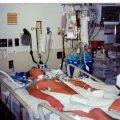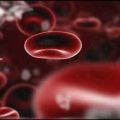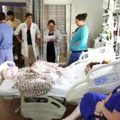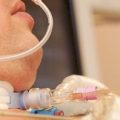Podcast: Play in new window | Download
Subscribe: Apple Podcasts | RSS
Hi, it’s Patrik Hutzel from INTENSIVECAREHOTLINE.COM where we instantly improve the lives for Families of critically ill Patients in Intensive Care, so that you can make informed decisions, have PEACE OF MIND, real power, real control and so that you can influence decision making fast, even if you’re not a doctor or a nurse in Intensive Care!
This is another episode of “YOUR QUESTIONS ANSWERED” and in last week’s episode I answered another question from our readers and the question was
My Critically Ill Husband is in Septic Shock. Was His Ischemic Gut Related to the Cardiac Arrest?
You can check out last week’s question by clicking on the link here.
In this week’s episode of “YOUR QUESTIONS ANSWERED” I want to answer questions from one of my clients Eva as part of my 1:1 consulting and advocacy service! Eva’s husband had cardiac bypass surgery, sustained a stroke in the ICU and now Eva is asking why her husband passed away, is it because of withheld dialysis and Norepinephrine?
My Critically Ill Husband is in Septic Shock and on dialysis. Did He Pass Away Because of Withheld Dialysis and Inotropes?
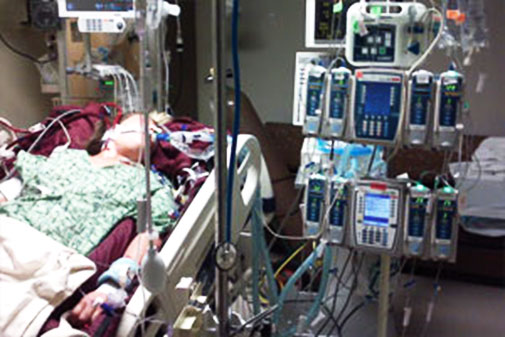
“You can also check out previous 1:1 consulting and advocacy sessions with me and Eva here.”
Patrik: Yeah. Because the risk factors were there.
Eva: Absolutely. And as soon as they started talking bowel obstruction seems that they should have looked at ischemia.
Patrik: Yeah.
Eva: Not at two in the morning.
Patrik: That’s right. Did they consult a gastric surgeon, do you know?
Eva: No.
Patrik: Right.
Eva: Well, they consulted with the surgical resident.
Patrik: Sure.
Eva: But I don’t believe there was a…
Patrik: Right. But not with a specialist.
Eva: No.
Patrik: The other thing, again from a nursing point-of-view, when a nurse starts their shift, one of the checks that they should perform is listening to whether there’s bowel sounds present or not.
Eva: Right.
Patrik: Right? So, the question to me would be: the days leading up to this, has there been any documentation around that? Did the nurses do that? What did they document if they did do it? Also, even the doctors during their rounds should have a listen to the abdomen.
Eva: No. The bowel sounds were normal.
Recommended:
Patrik: How do you know?
Eva: Because I was at rounds.
Patrik: Right. I really question that it’s been there since the infarct, unless it was slowly building up and there was blood flow, but blood flow was diminishing, but an infarct is also a sudden onset of the stop of blood supply.
Eva: Could have taking him off the CRT… could that trigger a blood clot? That’s when it happened.
Patrik: Oh, really?
Eva: Well, that’s when it his blood pressure dropped. Before, with this abdominal pain throughout the day, it wasn’t causing him any problems with the blood pressure. He was only on 2 milligrammes. Through the whole day he was totally stable.
Patrik: When you take somebody off the haemofilter, your blood pressure should actually go up, and I’ll tell you why.
Eva: Yes, and that’s why they thought that was a good time to give him a trial.
Patrik: Right.
Eva: Upto-
Patrik: With the Norepinephrine. It makes sense, but what may not have happened is … When the machine clots, you can’t return blood because the risk of basically reinfusing a clot into the body is high, okay? Are you following?
Eva: I believe that they stopped it before it clotted.
Patrik: Okay.
Eva: And they could return his blood.
Patrik: Okay. But the risk is still there that potentially a clot could have reinfused; the risk is always there. If I can, I would return the blood, if I can, just simply because you don’t wanna lose 150 millilitres in a critically ill patient.
Eva: That’s right.
Patrik: Okay? But, on the other hand, if I think the risk is too high to return blood because of clots, it could kill a patient.
Eva: Well, it did.
Recommended:
Patrik: Well, if that was the reason for the infarct.
Eva: How would you tell any different?
Patrik: You probably couldn’t because at the end of the day you couldn’t-
Eva: They stopped his CRT, and within 45 minutes his blood pressure-
Patrik: Right. Again, that answer could potentially be in an autopsy.
Eva: Could it?
Patrik: I would think so, and I’ll tell you why. Again, I’m not a pathologist; however, let’s just say the clot was caused by the dialysis machine and you could find that clot in an autopsy, surly there would be ways, in this day and age, to extract the clot and see whether there’s any hint that this clot developed outside of the body.
Eva: Oh, okay.
Patrik: I am not a pathologist, but that would be … I would think along those lines. But you would have to discuss that with a pathologist to see whether they could or couldn’t find those specific answers.
Eva: Okay. Yeah. He obviously just could not handle another assault.
Patrik: He couldn’t handle another setback.
Eva: No.
Patrik: Bearing in mind that a mesenteric infarct is a very big event.
Eva: Yeah.
Patrik: Did you get that text that I sent to you?
Recommended:
Eva: Yes.
Patrik: Right. Have a read there when you have time. The mortality is pretty high.
Eva: I can see now. Yeah.
Patrik: The mortality would be around 50%; which means with your husband’s history, the chances were there that this was too much for him.
Eva: Yeah. Can I ask you about the previous week when he was up on the ward?
Patrik: Uh-huh (affirmative).
Eva: What happened is they decided he was stable. He had had a couple of days on the CRT took him off, kidneys started working again. He had one session with the IHD, spent maybe another couple days, and then they decided he was ready to send back to the ward. So, the transition up there was pretty fast. I got up there in the evening and settled him in. He wasn’t on any intravenous, he wasn’t on anything at that point in time and he still had the tube feed, so on the wards, they don’t run the tube feeds through the night. There weren’t the nursing staff, so they stopped it at 10:00 and then I believe they start it again at 6:00 in the morning.
Patrik: Yeah.
Eva: So, when the nephrologist came in, there has been a slight bump-up in the creatinine, and so I said to him, “Did you know that there is no fluids run through the night,” and he said, “Well, that’s not good.” So, he went off to write one up. When the dietician came in, I told her the same thing, and she said, “Yeah. So, what we have to do …” So, he was kind of short-changed by eight hours of fluid the night before.
Patrik: Yeah.
Eva: So, the dietician said, “Well, what we have to do is bump up the amount of fluid he gets during the day to compensate for the fact that he doesn’t get it at night.”
Patrik: Right. Yeah.
Recommended:
Eva: So, she came up with a new thing and left it. They came in for a meeting at 2:00, and I asked about it, and they had not seen the note from the dietician so it had not been increased; and then when they went to increase it, they blocked the tube. This was on the Monday; it was blocked until the next day at about 6:00. At about 5:30, maybe 6:30, they started intervenous, and then that was until 11:00, and then stopped it. Then, the Tuesday nobody started an intravenous until much later in the day, and they spent all day trying to unblock the tube, which they couldn’t do. Finally, at about 4:00, I called the help line to say that he had not gotten any nutrition or medications or whatever for two days now, with no indication of when it would be able to be replaced. So, they got someone up, they replaced it, it took some fiddling, and about 10 o’clock that night they gave him something, and then stopped it.
Patrik: Yeah.
Eva: So, six o’clock the next morning now his creatinine is all out of whack.
Patrik: Sure. Yeah. That certainly didn’t help, that’s for sure. It didn’t help.
Eva: Then, come Friday, the feeding tube actually gets pulled out, and the cardiac surgeon and the resident decided it’s fine … even though he has not started eating yet, he’s had minimal food … that it’s fine to leave it out and start introducing food, because it’s okay for him to run dry.
Patrik: Yeah.
Eva: So, he hates what they’ve given him; he won’t drink it. He has to take his medication crushed up in this horrible nectar fluid; it burns his mouth, so he doesn’t want to eat anymore, and by Monday he is so dehydrated that I go to them and say, “He has to have an IV. He’s not getting any fluids,” and by Monday night now he’s septic and in shock.
With your background, those periods of time without any fluids and any nutrition-
Patrik: Not good.
Recommended:
Eva: Does that border on negligence?
Patrik: Not good. It’s not good. Imagine you are healthy and you’re not getting any fluids or any nutrition, how does it make you feel?
Eva: Yeah.
Patrik: Now, you’re sick, you’re critically ill, how does it make you feel? Right?
Eva: Yeah. He was on the path to recovering.
Patrik: Right. Exactly. So, I think what would be good probably is if you get the medical record.
Patrik: Now, Eva, can I call you back in about an hour, or is that too late for you? I do need to make two quick phone calls, one to my assistant. If I called you back in an hour, is that too late for you?
Eva: No, that should be fine. That’s fine.
Patrik: I’ll call you back in about an hour. I just need to get a couple of phone calls out of my way.
Eva: Absolutely.
Patrik: Because for me it’s just before 5:00 p.m. and I just need to get that done, and then I’ll call you right back.
Eva: Sure. That’s fine.
Patrik: Okay. Thank you, Eva. Bye.
Eva: Hi. Sorry, I lost you.
Patrik: That’s okay. When this all happened in the middle of the night Eva, was the unit attended by senior medical staff? Or was it only junior medical staff?
Eva: There was a resident.
Patrik: So the consultants weren’t around.
Eva: No, attendings are not around at night, so she talked to him by phone, but he did not come back.
Recommended:
Patrik: Mm-hmm (affirmative), look, a good unit, a good ICU, should have a senior consultant there overnight.
Eva: Right.
Patrik: That’s how I feel. How many beds are in this ICU?
Eva: Twenty-five, I think, 24.
Patrik: Pretty big, pretty big.
Eva: That’s a couple of-
Patrik: I feel that that should be, there should be more than just a junior doctor.
Eva: Yeah.
Patrik: And because at the end of the day, a registrar yes, they’re not like in the early stages of their career, but they still need guidance from a consultant. At the same time, the instructions were probably already given by the consultant, you know.
Eva: Right.
Patrik: In terms of how to manage the situation.
Eva: Yeah. I’m not sure there’s not much more for me to ask.
Patrik: I think what you may have to decide in the next 24 hours is probably, whether you want an autopsy or not. I think that’s what you have to decide, probably in the next 24 hours.
Eva: Yeah, right. Does it hurt? Is it add practise to run on many high Norepinephrine?
Patrik: It’s not … I wouldn’t say it’s bad practise at all. It’s often simply driven by necessity. What do I mean by that? When somebody’s on high doses of norepinephrine, the only reason they give high doses of Norepinephrine is to keep the patient alive.
Recommended:
Eva: Right.
Patrik: Norepinephrine is life support.
Eva: Yeah.
Patrik: Okay, so it’s not a matter of … It would be bad practise not to give it when patients need it. That would be really bad practise.
Eva: Right.
Patrik: Right, but high doses of Norepinephrine, if you do do that, it’s simply a necessity to keep people alive.
Eva: Okay. One of the things that I looked at that day that concerned me again, and I don’t know, but there was such a discrepancy between what the arterial line blood pressure was reading and the blood pressure cuff was reading. You know, in this case, the cuff was reading 98 over 84 to the map of 91.
Patrik: Mm-hmm (affirmative).
Eva: And the arterial line was 76 over 45, which was fifty-six.
Patrik: Mm-hmm (affirmative).
Eva: They were huge.
Patrik: Yeah, I would always go with the blood pressure cuff on the arm, not with the arterial line.
Eva: Yeah, and so it’s one … Like, I don’t know why it was so high. Of course, now it’s…
Patrik: Yep, the question would be then, did they titrate the Noradrenaline according to the arterial line or according to the blood pressure cuff. That’s the question.
Eva: The basis is the arterial line is pre-intermittent.
Patrik: Mm-hmm (affirmative). So they would have most likely gone with the non-invasive blood pressure cuff.
Recommended:
Eva: I guess I don’t actually have a picture of the one, when he was crashing in. Okay, so I will think on that then.
Patrik: I do believe if you go down the track of autopsy, you know, you don’t have too much time to make that decision.
Eva: Yep, no.
Patrik: You would have to call the hospital, I believe, if you wanted to go down that track.
Eva: Right.
Patrik: One way to get some answers would be to review the medical records.
Eva: Right.
Patrik: I do feel like maybe not now is not the right … Now is not the right time, but I do feel you would need to make your concerns known to the hospital. I feel that way, for your own sake.
Eva: Yes, yeah, yeah. No, I think now is the right time, actually.
Patrik: Okay, yeah, sure, sure, I understand the way you feel. The other thing that we could do is, well, and it’s really up to you. The other thing that we could do is, we could do an interview. We could share this with my audience, which is basically other families in Intensive care.
Eva: Right, right.
Recommended:
Patrik: You know, I would love for you to do that, but at the same time, you have to be ready for that, you know, do like, a 20 or 30 minute interview, share your concerns. And your concerns are not dissimilar to a lot of other clients that I’m dealing with, are very similar, unfortunately.
Eva: Right.
Patrik: You know, but I do not want you to … You know, you need to feel ready for that. You have probably, other things to deal with for now.
Eva: Right.
Patrik: But I would, if you can share your experience, I would be grateful.
Eva: Okay.
Patrik: And other people would be grateful, but you have probably way more pressing things to deal with for now.
Eva: Can I ask one more question?
Patrik: Sure.
Eva: One of the things that I felt, they kept thinking that they needed to draw more fluid off.
Patrik: Yep, uh-huh.
Eva: Draw more fluid off, draw more fluid off.
Patrik: Yep.
Recommended:
Eva: And then, they talked about him being too dry.
Patrik: Yep, okay.
Eva: And then, so it seemed to be this bouncing yo-yo, and they tried the Kelt test, and honestly, you didn’t have a lot of fluid in there to tilt back to his heart. I don’t know how they thought that was gonna rebound and…
Patrik: Yep.
Eva: Yeah.
Patrik: So, I tell you my views on that. Why they kept talking about this? And also, why they kept him dry? So, there were two major risks I would argue for your husband being fluid overloaded, right? Number one is, the weak heart, you do not want to fluid overload a weak heart.
Eva: Yeah.
Patrik: Okay, that’s number one. The other big risk was that one of the goals would have been to keep your husband off the ventilator, right?
Eva: Mm-hmm (affirmative).
Patrik: But if you fluid overload somebody with a weak heart, chances are that some of those fluids would be pushed back into the lungs…
Eva: Right.
Patrik: And then potentially increase the risk for intubation. In nine patient out of … Oh, maybe in eight patients out of 10 in intensive care, you would want to keep them dry. Why is that? Simply because most patients in ICU are either ventilated, or they are at high risk of being ventilated.
Eva: Right.
Patrik: The last thing you want is fluids on the lungs.
Eva: Yeah.
Patrik: That’s the first organ that would suffer from fluid overload, or one of the organs that would suffer from fluid overload is the lungs. And if the lungs do suffer from fluid overload, the risk is huge for either staying on the ventilator for longer than necessary, or getting on the ventilator.
Patrik: So, I know why they would talk about keeping him dry and drying him out. There is a reason for that. And from my experience, I personally wouldn’t dispute that. That’s almost like an unwritten rule in ICU, keep patients dry. Because you’ve got the risk of ventilation. You need a dry lung, or you have the risk for somebody to go on a ventilator if the lungs are wet.
Eva: Yeah.
Recommended:
Patrik: And a lot of patients, again, unfortunately, they have a weak heart as well in ICU.
Eva: Yeah.
Patrik: So it’s all of that.
Eva: Well, it just seemed to really lend to the lethargy and lack of energy as well.
Patrik: Yes.
Eva: Okay Patrik, I really appreciate your help. I wish we’d had a different outcome here, but you were helpful.
Patrik: That’s good to know, that’s good to know. I’m very sad that this happened. I feel like for your own sake, you know, you will need to get some answers.
Eva: Okay.
Patrik: You know, probably for your own sake, to find some closure.
Eva: Okay, all right, I will think on that. And I will think about the interview, too.
Patrik: Yeah, absolutely.
Eva: Okay.
Recommended:
Patrik: In your own time then, in your own time, when you’re ready.
Eva: Okay, okay. Thank you so much.
Patrik: Okay, all the best for now Eva, let me know if you need anything.
Eva: Okay, okay.
Patrik: Thank you.
Eva: Okay, bye bye.
Patrik: Thank you, bye-bye.
The 1:1 consulting session will continue in next week’s episode.
How can you become the best advocate for your critically ill loved one, make informed decisions, get peace of mind, control, power and influence quickly, whilst your loved one is critically ill in Intensive Care?
You get to that all important feeling of making informed decisions, get PEACE OF MIND, CONTROL, POWER AND INFLUENCE when you download your FREE “INSTANT IMPACT” report NOW by entering your email below!
In Your FREE “INSTANT IMPACT” report you’ll learn quickly how to make informed decisions, get PEACE OF MIND, real power and real control and how you can influence decision making fast, whilst your loved one is critically ill in Intensive Care! Your FREE “INSTANT IMPACT” Report gives you in-depth insight that you must know whilst your loved one is critically ill or is even dying in Intensive Care!
Sign up and download your FREE “INSTANT IMPACT” REPORT now by entering your email below! In your FREE “INSTANT IMPACT” REPORT you’ll learn how to speak the “secret” Intensive Care language so that the doctors and the nurses know straight away that you are an insider and that you know and understand what’s really happening in Intensive Care! In your FREE report you’ll also discover
- How to ask the doctors and the nurses the right questions
- Discover the many competing interests in Intensive Care and how your critically ill loved one’s treatment may depend on those competing interests
- How to eliminate fear, frustration, stress, struggle and vulnerability even if your loved one is dying
- 5 mind blowing tips & strategies helping you to get on the right path to making informed decisions, get PEACE OF MIND, control, power and influence in your situation
- You’ll get real world examples that you can easily adapt to your and your critically ill loved one’s situation
- How to stop being intimidated by the Intensive Care team and how you will be seen as equals
- You’ll get crucial ‘behind the scenes’ insight so that you know and understand what is really happening in Intensive Care
- How you need to manage doctors and nurses in Intensive Care (it’s not what you think)
Thank you for tuning into this week’s YOUR QUESTIONS ANSWERED episode and I’ll see you again in another update next week!
Make sure you also check out our “blog” section for more tips and strategies or send me an email to [email protected] with your questions!
Also, have a look at our membership site INTENSIVECARESUPPORT.ORG for families of critically ill Patients in Intensive Care here.
Or you can call us! Find phone numbers on our contact tab.
Also check out our Ebook section where you get more Ebooks, Videos and Audio recordings and where you can also get 1:1 counselling/consulting with me via Skype, over the phone or via email by clicking on the products tab!
This is Patrik Hutzel from INTENSIVECAREHOTLINE.COM and I’ll see you again next week with another update!



